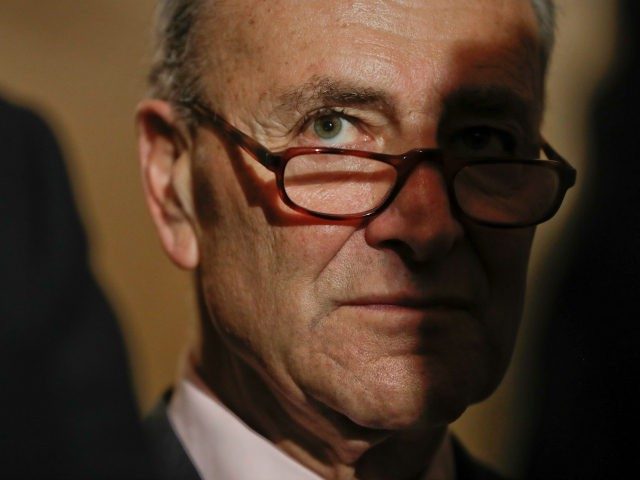The Democrats’ Senate leader, Chuck Schumer, suggested to reporters Tuesday that he could endorse spending more than $1.6 billion in 2019 for President Donald Trump’s border wall.
“We are for strong border security,” Schumer said, adding, “The $1.6 billion for border security negotiated by Democrats and Republicans is our position. We believe that is the right way to go … Stick to the $1.6 billion … We’re not negotiating in the press. This is our position.”
But Schumer did not suggest what price he may demand in exchange for agreeing to President Donald Trump’s demand that $5 billion in border wall funding be included in the delayed 2019 budget for the Department of Homeland Security.
The Democrats’ political price may be legislation protecting the Robert Mueller investigation of Trump, a border wall amnesty for three million DACA illegal migrants, or legislation that fast-tracks 200,000 H-1B middle class outsourcing workers into citizenship.
Reporters did not ask Schumer if he was willing to accept the migration law changes that Trump has repeatedly demanded. Without several legal changes, many Central American migrants will continue using the asylum application catch-and-release loophole through Trump’s $5 billion concrete and rebar border wall.
If the legislators and the White House cannot strike a border wall deal, and if Trump does not back down, parts of DHS will run out of funding on December 7, creating a partial government shutdown crisis.
The border-wall negotiations will become more complex if GOP leaders also add several donor-demanded cheap labor measures to the pending 2019 budget bill for the Department of Homeland Security.
For example, several Senate and House GOP leaders have drafted a plan to expand the H-2B visa worker program so that it provides U.S. employers with 500,000 or more extra foreign blue-collar workers. The unreleased agreement would allow U.S. investors and employers to hire cheap foreign workers when Americans ask for a wage increase.
Many GOP cheap labor Senators also oppose a border wall, instead uring development of an easily-deactivated “wall system” The DHS fight “points to … the importance of having a wall system, whether that’s entirely a physical wall or a technological wall,” according to South Dakota Sen. John Thune, who will be the third-ranking GOP leader in the Senate during 2019.
In July, GOP leaders in the House added several visa worker expansions to the DHS 2019 funding bill.
The expansions included a bill pushed by Kansas GOP Rep. Kevin Yoder which would put at least 200,000 college graduate outsourcing workers on a fast track to green cards, permanent U.S. jobs, and citizenship. The bill would also change green cards rules and likely help Indian firms hire at least 200,000 extra Indian H-1b visa workers for U.S. jobs. Yoder says the bill’s ending of “country caps” is a fair offer to the many Indian visa workers who are trying to get citizenship.
Many companies favor hiring Indian H-1Bs instead of Americans because the Indian workers will work long hours at low salaries without complaint because they hope to get U.S. citizenship for themselves, their spouses and children, plus their extended families and all of their descendants.
In November, Yoder lost his Kansas election partly because American college graduates protested his outsourcing bill.
Many Democrats automatically put interests of cheap-labor employers far ahead of American employees who want wage increases in a tight labor market. For example, Minnesota Sen. Amy Klobuchar declared November 25 that “we have the will to put the money at the border for better security and combine it with some sensible reforms, including things like a path to citizenship, things like making sure we have workers on our fields and in our factories that we need.”
In the United States, the establishment’s economic policy of using migration to boost economic growth shifts wealth from young people towards older people by flooding the market with cheap white-collar and blue-collar foreign labor. That flood of outside labor spikes profits and Wall Street values by cutting salaries for manual and skilled labor offered by blue-collar and white-collar employees.
The policy also drives up real estate prices, widens wealth gaps, reduces high tech investment, increases state and local tax burdens, hurts kids’ schools and college education, pushes Americans away from high tech careers, and sidelines at least five million marginalized Americans and their families, including many who are now struggling with opioid addictions.
Immigration also pulls investment and wealth away from heartland states because coastal investors can more easily hire and supervise the large immigrant populations who prefer to live in the coastal states.

COMMENTS
Please let us know if you're having issues with commenting.